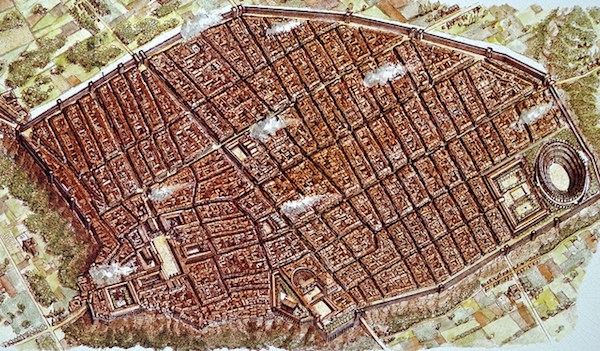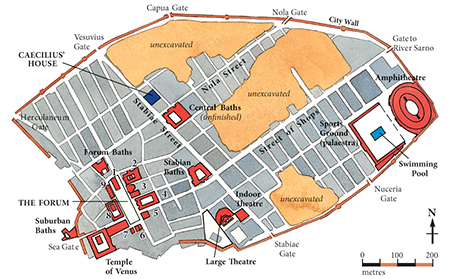Pompeii
Embark on a captivating virtual exploration of the ancient city of Pompeii through our intricately detailed digital map. Immerse yourself in the rich tapestry of Pompeii’s streets, forums, and homes, experiencing the vibrant life of this Roman city frozen in time.

Our interactive map meticulously recreates the layout of Pompeii, allowing you to navigate its streets and alleys with ease. Explore the architectural marvels, from the grand amphitheater and temples to the intimate spaces of private residences. Every corner of the city is brought to life, providing a nuanced understanding of Pompeii’s urban design.
Zoom in to discover the intricate details of the city’s renowned frescoes, mosaics, and architectural features. Uncover the stories etched into the walls of houses, shops, and public spaces, offering a glimpse into the daily lives of Pompeii’s inhabitants.
Markers scattered across the map serve as gateways to Pompeii’s past, offering historical insights into each site’s significance. Whether you’re drawn to the well-preserved Forum, the haunting remnants of the Temple of Apollo, or the bustling marketplaces, our map provides a comprehensive guide to Pompeii’s archaeological wonders.

This digital map is not just a visual recreation; it’s a dynamic tool for historical discovery. Gain a deeper appreciation for Pompeii’s cultural heritage, urban planning, and the impact of the catastrophic eruption of Mount Vesuvius.
Step into the world of ancient Pompeii, where the echoes of daily life and the remnants of a bygone era come to life through our meticulously crafted digital map. Immerse yourself in the fascinating history of this archaeological marvel and uncover the secrets hidden beneath the ash.
For scholarship on the city see the Pompeii Reading List.
Glossary
- Aedile – Town magistrate who managed the day to day administration of public buildings and regulation of public festivals.
- Ala – Wing or alcove opening to left and/or right of the atrium of a Roman house.
- Amphitheatrum – An amphitheatre.
- Apodyterium – A changing room of a Roman baths.
- Ara – An altar.
- Atrium – The main hall of a Roman house.
- Basilica – Colonnaded public hall on the Forum, used for commercial transactions and dispensing of justice.
- Caldarium – The hot room of a Roman baths.
- Caupona – An inn or tavern, which served hot food.
- Compluvium – An opening in the roof, which had below it, a water tank (impluvium) in the atrium floor.
- Cubiculum – A bedroom.
- Domus – A house within a city.
- Duovir – Two senior magistrates of the colony, elected annually, who presided over the decurion council.
- Fauces – Entranceway to a house, leading to the atrium.
- Fons – Public fountain.
- Forum – A Forum was the main center of a Roman city. Usually located near the physical center of a Roman town, it served as a public area in which commercial, religious, economic, political, legal, and social activities occurred. Fora were common in all Roman cities, but none were as grand as the fora of Rome itself.
- Frigidarium – The cold room of a Roman baths.
- Fullonica – A laundry.
- Hospitium – Inn or lodgings.
- Impluvium – A water tank on the floor of the atrium, which had directly above it, an opening (compluvium) in the roof.
- Lararium – A shrine to the household gods.
- Macellum – A market.
- Nymphaeum – A ornamental fountain.
- Oecus – The main living room of a Greek house, introduced to Roman architecture along with the peristyle. Often used for dining.
- Palaestra – An open area surrounded by covered porticoes used for wrestling and exercise, often forming part of a Roman bath complex.
- Peristyle – An open courtyard or garden surrounded by a colonnade.
- Pistrinum – A bakery or mill.
- Popina – A wine bar, with a simple selection of foods also available.
- Porta – A town gate.
- Posticum – A house’s second entrance, or backdoor.
- Sacellum – A shrine.
- Statio Vindemitorum – A grape-gatherer’s post, part of the wine-making process.
- Taberna – A shop.
- Tablinum – A study.
- Templum – A temple.
- Tepidarium – The warm room of a Roman baths.
- Theatrum – A theatre
- Thermae – Roman bath complex.
- Thermopolium – A bar, where hot and cold food was sold over the counter.
- Triclinium – A dining room.
- Villa – A house in the country.
